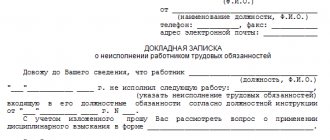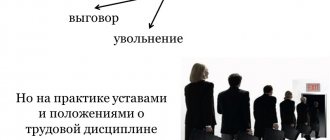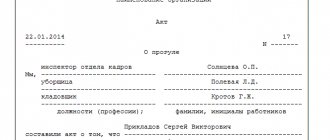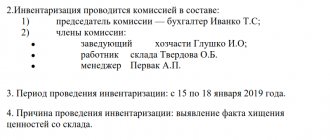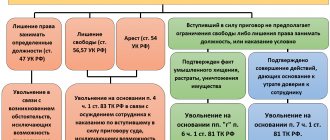Home / Labor Law / Dismissal and layoffs / Dismissal
Back
Published: 06/17/2016
Reading time: 6 min
0
653
Labor legislation (Article 81 of the Labor Code) gives the employer the right to terminate an employment contract with an employee who has repeatedly failed to fulfill his or her job duties.
How to properly and legally fire such an employee?
- Grounds for dismissal
- How to record non-compliance?
- Dismissal procedure
- Payments
- Consequences for the employee
- Employer's liability for wrongful dismissal
- Legal disputes Case No. 1
- Case No. 2
Grounds for dismissal
Repeated failure to comply in this case means that a disciplinary sanction (more lenient than dismissal) was previously applied to the employee, and it has not been lifted at the time of the new offense (less than a year has passed since its application).
If the previous punishment has ceased to apply, then the person is considered to have no penalties and cannot be fired for non-compliance. That is, even if an employee works very poorly, and management has made comments to him on this matter many times, but this fact does not have documentary evidence, then after the management’s patience has run out, they will not be able to fire him immediately.
It will be necessary to impose at least one penalty on the employee that does not entail dismissal, and if the violation is repeated sooner than a year later, there will be grounds for dismissal.
Such rules apply to the employee’s failure to fulfill the duties stipulated in his employment contract, job descriptions and other local acts of the organization with which he is familiar.
The legislation introduces such a concept as a single gross violation by an employee of his duties (Part 6 of Article 81 of the Labor Code).
If a violation of this kind is detected, the employee can be dismissed immediately.
Such cases include absenteeism, showing up at work while intoxicated, committing a crime in the workplace, etc.
Therefore, in order to determine whether it is possible to dismiss the offender, it is very important to correctly qualify his offense.
The procedure for dismissal due to failure to fulfill job duties
The dismissal must be carried out in accordance with the prescribed procedure. If the employer ignores this procedure, the employee can also challenge the dismissal. Let's consider the main stages of the procedure:
- Recording the grounds for dismissal. Involves control over labor discipline with subsequent recording of violations in writing. This stage is regulated by Article 81 of the Labor Code of the Russian Federation.
- Confirmation of the legality of dismissal. An explanation must be obtained from the employee regarding the fact of failure to fulfill duties. At this stage, an existing disciplinary sanction is identified that has not expired. The possibility of dismissal is checked (a number of employees cannot be fired).
- Documentation of termination of an employment contract. The manager issues a dismissal order. A note-calculation is also published. The employee is sent notice of dismissal. A corresponding entry is made in the work book.
- Carrying out calculations. The employer must pay the employee wages for the period worked and compensation for unused vacation.
- Delivery of documents. On the day of dismissal, the employee must receive a work book and other documents. This necessity is established by Article 84.1 of the Labor Code of the Russian Federation.
If the employer does not give the employee wages and documents, the latter may go to court to restore his rights.
Drawing up an explanatory note
Before dismissal, the employer must receive an explanatory note from the employee. It indicates the reasons why the failure to fulfill labor duties occurred. In the future, the employer, based on the explanatory note, is obliged to:
- study the explanations provided;
- assess the severity of the employee’s guilt;
- study the situation preceding the violation.
ATTENTION! The employee is given 2 days to draw up an explanatory note.
The manager must also take into account the employee's previous behavior. The employee may refuse to draw up an explanatory note. This does not relieve the employee of responsibility. In this case, the employer must draw up a report. It states:
- The fact of contacting an employee to receive an explanatory note.
- Fact of refusal to draw up a document.
The document must have the signatures of a number of key employees: deputy director, secretary, lawyer.
Making an entry in the work book
First you need to enter the date of dismissal. Then the following form is written:
“Dismissed due to repeated failure to fulfill job duties without valid reasons on the basis of paragraph 5 of Article 81 of the Labor Code of the Russian Federation.”
In the last column you need to refer to the date and order number.
How to record non-compliance?
Recording of the committed offense must be documented .
Most often, this is done by drawing up a memo (also called an official note) addressed to a superior manager by the violator’s immediate superior or another employee who discovered the misconduct. This paper may be accompanied by other materials confirming the information contained in it, for example, recording from a CCTV camera.
When is dismissal prohibited?
An employer does not always have the right to fire a negligent employee who does not perform his duties. There is a certain category of employees who cannot be fired for certain reasons.
Dismissal is not allowed for repeated violation of a pregnant woman’s work duties. Even in case of repeated or one-time gross violation of labor regulations or failure to fulfill assigned functions, this category of employees cannot be dismissed.
In this case, the employer’s solution is to issue a reprimand or warning.
Dismissal procedure
After receiving the note, the head of the organization conducts an internal investigation, during which he finds out all the circumstances and reasons for the employee’s failure to fulfill his duties.
It is possible to obtain written explanations from other employees who can confirm that the violator really did not fulfill his duties and explain what circumstances caused this.
The employee is asked to provide a written explanation of the nature of the inspection.
It is important to establish that he committed the non-compliance deliberately without compelling valid reasons.
If he did not have the opportunity to do otherwise, for example, he did not have the materials to carry out work activities or some kind of incident occurred at the enterprise, and the employee took part in eliminating its causes and providing assistance to the victims instead of fulfilling his direct duties, then the dismissal will be unlawful.
If the audit shows that the employee did not have valid reasons for not working, then the manager issues an order to impose a disciplinary sanction on the employee in the form of dismissal.
As mentioned above, this requires the presence of a previously imposed unlifted penalty.
The order must reflect the circumstances of the employee’s failure to fulfill his duties, a link to the document in which the unfulfilled duty is recorded, and links to materials confirming the information presented.
The employee must be familiarized with the order against signature, and in case of refusal to sign, this fact must be recorded.
At the final stage of dismissal under the article, as in other cases of termination of employment relations, the amount payable to the employee is calculated and his documents are issued.
Disciplinary action
Disciplinary action must be imposed immediately upon discovery of an employee's misconduct. If time is needed to study the circumstances of the violation, establish the severity of the offense itself and its consequences, and the guilt of the employee, the legislation allocates no more than 30 days for this.
Disciplinary punishment cannot be imposed on an employee if the violation became known after 6 months or the reasons for the violation were valid:
- emergency situations confirmed by housing and communal services certificates;
- medical documents about the illness of relatives;
- medical report on the state of health of the employee who violated his duties;
- participation in investigative actions of law enforcement agencies.
The reason for violations will be considered valid if it is confirmed by witness testimony and official documents.
Article 192 of the Labor Code of the Russian Federation establishes three types of disciplinary punishment for employees who do not fulfill their job duties:
- a reprimand is a punishment for a minor offense, an isolated incident that does not entail serious consequences;
- reprimand - a serious penalty for repeated or serious violations of labor discipline, refusal to perform one’s official duties;
- Dismissal is an extreme measure of punishment for gross violation of discipline, safety standards, failure to comply with job descriptions, or systematically repeated misconduct. Even one time!
Reference! The guilty employee cannot be punished with two penalties for the same offense. The penalty is valid for 12 months.
If the employee has corrected himself and does not commit new violations, the penalty against him can be lifted before the end of the calendar year, ahead of schedule.
Employer's liability for wrongful dismissal
If the employee does not take any measures, the employer, even if he fired him wrongfully, will not bear any responsibility. Therefore, if there is information that the dismissal procedure was carried out in violation of the law, then these arguments must be presented in a statement of claim and sent to the court.
The plaintiff who wins in such proceedings will be reinstated at work, and the employer will be required to pay for the period from the date of dismissal until reinstatement.
This amount may be increased if the court can be convinced that the dismissal caused moral suffering to the employee.
The bonus remuneration system is very effective in motivating employees to work productively. You will learn all about the negative aspects associated with gray wages by reading our article.
Night work must be paid at a special rate. Read more here.
Detection of labor discipline violations
After or at the time an employee commits a violation of labor discipline, the employer must record the violation. At the same time, the Labor Code does not provide for such an obligation, but registration of the fact of violation is necessary in the interests of the employer himself - otherwise the employee has the opportunity to challenge the dismissal.
The procedure for identifying and registering violations in practice is as follows:
- The employer is informed by any means of a fact that is supposedly a violation of labor discipline. Methods of notifying the employer may include:
- a report from the boss of the offending employee, his colleagues or other employees;
- complaints from third parties (for example, clients of the organization);
- an act drawn up based on an act committed by an employee, for example, an act of refusal to undergo a medical examination.
- The employer checks the information received. For example, when the immediate supervisor of an absent employee notifies the manager that the offender is not at work, the manager assembles a commission, which necessarily includes an employee of the organization’s human resources department. The commission verifies the fact of absence and its reasons. The commission must approach the inspection responsibly. Thus, biased research, making an unfounded decision or conducting an inspection by an interested party is unacceptable, as stated, for example, in the appeal ruling of the Voronezh Regional Court dated June 17, 2014 No. 33-3172. The inspection must determine what the worker’s failure to perform or improper performance of official duties, interpreted as a violation, consists of, and also establish the time of its commission. The lack of data about this, according to the opinion of the Supreme Court of the Republic of Tatarstan, expressed in the appeal ruling dated 09/08/2014 No. 33-11352/2014, indicates that the fact of a disciplinary offense has not been proven. Practice also speaks of the need to correlate the misconduct with subsequent dismissal. For example, pointing out that there were no negative consequences for the organization, despite the stoppage of transport as a result of the employee’s absence, the Omsk Regional Court overturned the latter’s dismissal in an appeal ruling dated April 15, 2015 No. 33-2470/2015.
- Upon confirmation of the received information about the violation, a violation of official duties is recorded. Registration can be done in the form of an official audit report or another form. It is unacceptable to dismiss an employee if an audit does not reveal any violations. For example, in the appeal ruling dated August 22, 2014 No. 33-32951/2014, the Moscow City Court indicated that the inspection did not reveal any violation, therefore the dismissal order was illegal.
Litigation
Let's look at some examples of resolving the issue of the legality of dismissal on the grounds discussed in the article.
Case No. 1
Before his dismissal, the company’s driver was twice subject to disciplinary action: for negligence in his duties and failure to comply with the employer’s orders. The third penalty (dismissal) was also applied to him for failure to comply with the order. During the trial, it was established that before the third penalty was imposed, the plaintiff applied to the Labor Inspectorate, which subsequently obliged the employer to cancel the first and second orders to apply disciplinary sanctions to this employee.
The employer complied with this order and canceled these orders. However, he subsequently took into account the canceled orders when dismissing the employee as a basis for recognizing the failure to fulfill duties as repeated.
In fact, at the time of dismissal, the employee was considered to have no penalties, and therefore his dismissal was recognized as unjustified due to the absence of repeated failure to fulfill his duties.
As a result, the employee was reinstated and the unpaid wages were recovered in his favor.
Grounds for termination of an employment contract
According to the Labor Code of the Russian Federation, there are many grounds for terminating an employment relationship with an employee; they can be divided into 3 groups:
- at the request of the employee;
- at the initiative of the employer;
- due to circumstances beyond the control of the parties.
On the first basis, the employee has the right to resign at any time with prior warning to the employer. For the second group of reasons, dismissal can only be done in compliance with the correct form. The employer should carefully consider the implementation of such a procedure, since the lack of necessary documents and evidence entails the possibility of the employee going to court.
Among the grounds for termination of an employment agreement at the request of the employer are the following:
- inadequacy for the position held;
- repeated failure to fulfill labor duties in the presence of a penalty;
- single gross violation of labor duties and discipline;
- commission of guilty actions by an employee;
- liquidation of the enterprise;
- staff reduction.
One of the grounds is repeated failure to fulfill job duties. However, dismissal under it is permitted if the employee has previously had a disciplinary sanction.
Who should not be fired
The current legislation, by its rules, has established a ban on layoffs of certain categories of workers. Moreover, the position held or work experience does not matter. In certain cases, dismissal of an employee will be illegal:
- a pregnant woman was laid off (ban on dismissal under Art. 261);
- at the time the order was drawn up, the employee was on sick leave or on vacation;
- when hired, the person did not read the job description (no signature);
- according to part 7. Article 220 refused to comply with the demands of his superiors due to a threat to life and health.
The manager will be held liable for dismissal due to the above circumstances.
The practice of successful reinstatement of those dismissed for repeated violations of discipline
In accordance with clause 5, part 1, art. 81 of the Labor Code of the Russian Federation, an employment contract can be terminated by the employer in the event of repeated failure by the employee to fulfill his work duties without good reason, if he has a disciplinary sanction.
This basis is quite often used in practice by many employers, regardless of the form of ownership and scope of the enterprise.
An analysis of judicial practice shows that in most cases, employees do not agree either with the very grounds used by the employer for parting with them, or with the employer’s qualification of their actions/inactions as “failure to fulfill their labor duties.”
In this article, we suggest that you familiarize yourself with the state of judicial practice that has developed in the field of labor disputes arising specifically from dismissals on the basis mentioned - clause 5, part 1, art. 81 Labor Code of the Russian Federation. At the same time, based on the analysis of cases in which the employee SUCCESSFULLY managed to challenge his dismissal, have it declared illegal and received a court decision to reinstate him at work (or change the wording and date of dismissal), we will identify those mistakes of the employer that served as the basis for this turn of events not in favor of the employer.
1. Errors in the execution of orders for punishment and dismissal
Requirement: When issuing an order for punishment (including in the form of dismissal), the order must indicate: - what the employee is being punished for, that is, for what specific act, behavior, action/inaction; — what standards establish the requirement for an algorithm of employee behavior. That is, references must be given to clauses of specific local acts, job descriptions, rules, procedures, etc., which the employee violated by his actions. In addition, dismissal must be a proportionate measure of punishment for the employee’s mistakes. Source and interpretation of the requirement: from Art. 192 of the Labor Code of the Russian Federation it follows that a disciplinary offense should be understood as a culpable, unlawful failure or improper performance by an employee of his assigned job duties (violation of legal requirements, obligations under an employment contract, internal labor regulations, job descriptions, regulations, orders of the employer, etc. .). In the absence of at least one of these conditions, the application of a disciplinary sanction to an employee is unlawful. According to Art. 192 of the Labor Code of the Russian Federation, the employer has the right to apply the following disciplinary sanctions: 1) reprimand; 2) reprimand; 3) dismissal for appropriate reasons. Disciplinary sanctions, in particular, include the dismissal of an employee on the grounds provided for in paragraph 5 of Part 1 of Art. 81 Labor Code of the Russian Federation. The procedure for applying disciplinary sanctions is regulated by Art. 193 Labor Code of the Russian Federation. The Plenum of the Supreme Court of the Russian Federation in Resolution No. 2 of March 17, 2004 “On the application by the courts of the Russian Federation of the Labor Code of the Russian Federation” (hereinafter referred to as Resolution of the Plenum of the Supreme Court of the Russian Federation No. 2) explained that the employer must comply with such principles as fairness when applying a disciplinary sanction to an employee , equality, proportionality, legality, guilt, humanism. The employer must provide evidence indicating not only that the employee committed a disciplinary offense, but also that when imposing a penalty, the severity of this offense and the circumstances in which it was committed were taken into account, as well as the employee’s previous behavior and attitude to work.
Practice : A bank employee was fired under clause 5, part 1, art. 81 of the Labor Code of the Russian Federation (repeated failure by an employee to fulfill work duties without good reason, if he has a disciplinary sanction). She considered the disciplinary action and dismissal to be illegal and filed a lawsuit. The court found both orders (the reprimand and the dismissal) illegal, and the employee was reinstated. The main reason for recognizing the orders as illegal was that the employer did not bother to indicate in the orders themselves the specific norms of the employer’s local regulations that were violated by the employee. That is, everything that the employer later indicated in his response to the claim. In addition, the court found that the employee was not familiar with the full text of the local acts, the norms of which she actually violated. According to the presented extract from the plaintiff’s email, the employer asked the employee to familiarize herself only with chapters 17 and 18 of the Procedure, which she subsequently violated. Despite the fact that the court, during the consideration of the case, established facts of violation by the employee of the norms and rules in force in the bank, it still recognized the orders to punish the employee as illegal - due to violation of the rules for drawing up such documents. (decision of the Kirovsky District Court of Irkutsk dated October 4, 2013; appeal ruling of the Irkutsk Regional Court dated December 12, 2013 in case No. 10173/2013).
Conclusion: If the dismissal order does not set out the circumstances of the disciplinary offense charged to the employee, the specific provisions of job descriptions, orders, local acts of the employer, which were culpably violated by the employee in the performance of labor duties, are not indicated, and from the dismissal order it is impossible to determine what specific labor violation discipline committed by the employee, such orders cannot be recognized as legal.
2. Sequence errors: lack of “repeatedness”
Requirement: To apply the ground, there must be at least one more punishment applied and formalized in the prescribed manner to the same employee. That is, there must be a valid and not canceled order of punishment for a previously committed offense. Source and interpretation of the requirement: The requirement follows from the meaning of the very grounds for dismissal, that is, paragraph 5 of Part 1 of Art. 81 Labor Code of the Russian Federation. In accordance with the explanations contained in paragraph 33 of the Resolution of the Plenum of the Supreme Court of the Russian Federation No. 2, when resolving disputes of persons dismissed under paragraph 5 of Part 1 of Art. 81 of the Labor Code of the Russian Federation for repeated failure to fulfill labor duties without good reason, it should be taken into account that the employer has the right to terminate the employment contract on this basis, provided that a disciplinary sanction was previously applied to the employee, and at the time of repeated failure to fulfill work duties without good reason, it has not been lifted and not repaid. Within the meaning of the above explanations, dismissal of an employee on the above grounds is permitted in cases where the employee, having received a disciplinary sanction(s), commits a new disciplinary offense or continues a violation that began before the sanction was applied. Thus, in the event of repeated failure to fulfill labor duties, the employer has the right to terminate the employment contract only if he previously applied disciplinary sanctions to the employee that have not been lifted.
Practice: An employee dismissed under clause 5, part 1, art. 81 of the Labor Code of the Russian Federation, filed a lawsuit to declare all orders (on punishment and dismissal) illegal. As the court found, the plaintiff worked in the defendant's transport department as a car driver. The first order brought him to disciplinary liability in the form of a reprimand, as stated in the order, in connection with negligent attitude towards official duties. By the second order of the employer, the plaintiff was brought to disciplinary liability in the form of a reprimand for violation of clause 4.1.4 of the employment contract, which was expressed in refusal to execute the employer’s order. By the third order, the plaintiff was subjected to disciplinary action in the form of dismissal. The reason for the application of punishment was the plaintiff’s failure to fulfill his official duties, namely the order of the general director. The court found that the plaintiff had previously, before going to court, applied to the State Labor Inspectorate, which, based on the results of the defendant’s inspection, issued an order demanding the cancellation of orders No. 1 and 2. In pursuance of this order, the plaintiff’s employer voluntarily canceled orders No. 1 and 2 (about reprimand and reprimand). In deciding to refuse to satisfy the employee’s claims to cancel orders No. 1 and 2, the court proceeded from the fact that these orders, contested by the plaintiff, were voluntarily canceled by the employer at the time the case was considered by the court. Since, in connection with the cancellation of these orders, the plaintiff’s labor rights in this part were restored, the court had no grounds for re-cancelling the orders. Satisfying the plaintiff’s claims for the cancellation of orders to apply a disciplinary sanction in the form of dismissal and an order to terminate the employment contract with the employee (dismissal) of the plaintiff, the court reasonably came to the conclusion that there were no legal grounds for the plaintiff’s dismissal under clause 5 of Part 1 of Art. 81 Labor Code of the Russian Federation. In connection with the employer’s cancellation of orders No. 1 and 2, according to the court, there was no sign of repeated failure by the employee to fulfill work duties without a good reason and the presence of outstanding disciplinary sanctions, which in turn entails the cancellation of dismissal orders. The employee was reinstated in his previous position (decision of the Millerovsky District Court of the Rostov Region dated May 21, 2013; appeal ruling of the Rostov Regional Court dated August 1, 2013 in case No. 33-9646/2013).
Conclusion: If the employer voluntarily canceled orders to bring to disciplinary liability, which in turn created a repeated failure by the employee to perform work duties without good reason and the presence of outstanding disciplinary sanctions, then the order of dismissal under clause 5 of part 1 of Art. 81 Labor Code of the Russian Federation.
3. Mistakes of action: violation of the procedure for bringing to disciplinary liability
Requirement: Before applying a penalty, the employer is obliged to request an explanation from the employee regarding the fact of the misconduct, giving him two full days for this. Source and interpretation of the requirement: In accordance with parts one and two of Article 193 of the Labor Code of the Russian Federation, before applying a disciplinary sanction, the employer must request a written explanation from the employee. If after two working days the employee does not provide the specified explanation, then a corresponding act is drawn up. Failure by an employee to provide an explanation is not an obstacle to applying disciplinary action. If the issue of applying a disciplinary sanction to an employee is resolved before the expiration of two working days after requesting a written explanation from him, then the procedure for applying a disciplinary sanction in the form of dismissal is considered violated, and the dismissal by virtue of Part 1 of Art. 394 of the Labor Code of the Russian Federation – illegal. A different interpretation of these norms would mean that the employer does not have to comply with the deadline for the employee to provide an explanation and the possibility of the employer ignoring the requirements of Part 1 of Art. 193 of the Labor Code of the Russian Federation, and therefore would entail the loss of the meaning of these norms and a significant violation of the employee’s right to provide an explanation within the period established by law.
Practice: A senior official of an educational institution was dismissed at the initiative of the employer. The basis for terminating his employment contract were letters from the Ministry of Education and Science, according to which the district leadership was ordered to relieve him of his duties due to violations of the Unified State Examination in the district. The dismissed employee did not agree with such dismissal, considering it illegal due to lack of grounds and violation of the dismissal procedure. The court, having examined the submitted letter from the Ministry of Education and Science, came to the conclusion that the defendant did not provide evidence indicating the existence of grounds for imposing a disciplinary sanction in the form of dismissal. The defendant did not provide evidence to the court that the plaintiff did not perform or improperly performed his official duties, and what exactly these official duties were. In addition, the wording in the order - “for numerous violations committed during the Unified State Exam” - as one of the grounds for the dismissal of the plaintiff, was correctly recognized by the court as unfounded, since it is of a general nature and is not specifically confirmed by anything, that is, such evidence was not presented to the court by the defendant . In addition, as can be seen from the case materials, the employer applied a disciplinary sanction to the plaintiff in the form of dismissal without asking for an explanation, which is a violation of the requirements of Art. 193 Labor Code of the Russian Federation. In addition, the dismissal order was issued while the plaintiff was on vacation, which indicates a direct violation of labor legislation (Part 6 of Article 81 of the Labor Code of the Russian Federation). Based on the above, the court declared the dismissal illegal and reinstated the employee (decision of the Kaitag District Court of the Republic of Dagestan dated August 26, 2013; appeal ruling of the Supreme Court of the Republic of Dagestan dated November 19, 2013 in case No. 33-4068/2013).
Conclusion: Violation of the procedure for bringing an employee to disciplinary liability (for example, failure to request an explanation for the fact of violation of discipline), as well as failure to comply with the requirements of Part 6 of Art. 81 of the Labor Code of the Russian Federation on the prohibition of dismissal of an employee on the initiative of the employer during the period of his vacation or illness, is the basis for recognition of dismissal under clause 5 of part 1 of art. 81 of the Labor Code of the Russian Federation is illegal.
4. Time errors: delay in punishment
Requirement: Article 193 of the Labor Code of the Russian Federation establishes pretrial deadlines for bringing an employee to disciplinary liability, issuing an order for punishment (dismissal), and for familiarizing the employee with the order. In addition, the period during which an employee is considered subject to disciplinary action has been established - one year. Source and interpretation of the requirement: According to parts 3 and 4 of Art. 193 of the Labor Code of the Russian Federation, disciplinary sanction is applied no later than one month from the date of discovery of the misconduct, not counting the time of illness of the employee, his stay on vacation, as well as the time required to take into account the opinion of the representative body of employees. A disciplinary sanction cannot be applied later than six months from the date of commission of the offense, and based on the results of an audit, inspection of financial and economic activities or an audit - later than two years from the date of its commission. The specified time limits do not include the time of criminal proceedings. In accordance with Art. 194 of the Labor Code of the Russian Federation, if within a year from the date of application of the disciplinary sanction the employee is not subject to a new disciplinary sanction, then he is considered to have no disciplinary sanction. The employer, before the expiration of a year from the date of application of the disciplinary sanction, has the right to remove it from the employee on his own initiative, at the request of the employee himself, at the request of his immediate supervisor or a representative body of employees. If the employer punishes the employee beyond the time limits specified in Art. 193 of the Labor Code of the Russian Federation, or on the basis of “repeatedness” required for the basis provided for in paragraph 5 of Part 1 of Art. 81 of the Labor Code of the Russian Federation, applied a punishment order, more than one year has passed since the date of its issuance, then dismissal on the basis in question is considered illegal.
Practice: An employee who was dismissed for repeated failure to fulfill his job duties without good reason went to court to challenge his dismissal. During the consideration of the case, it was established that by order issued in February, he was reprimanded for failure to comply with July order No. 4. The deadline for fulfilling the duties assigned to the plaintiff by July order No. 4 was established by the same order until the end of August. Thus, it was established that the employer already in September knew about the plaintiff’s failure to fulfill the duties assigned to him by July Order No. 4, but punished him only in February, that is, after the deadline for imposing a penalty established by Art. 193 of the Labor Code of the Russian Federation (for punishment a period of one month is established from the date of discovery of the offense). Taking into account the above, the court rightly declared it unlawful to subject the plaintiff to disciplinary liability in the form of a reprimand. Guided by the provisions of clause 5, part 1, art. 81 of the Labor Code of the Russian Federation, as explained by the Plenum of the Supreme Court of the Russian Federation, the court, having established the illegality of bringing the plaintiff to disciplinary liability in the form of a reprimand by the February order, came to the correct conclusion that in such circumstances the dismissal of the plaintiff under clause 5 of part 1 of Art. 81 of the Labor Code of the Russian Federation for repeated failure by an employee to fulfill work duties without good reason is illegal (decision of the Zheleznodorozhny District Court of Rostov-on-Don dated October 27, 2010; cassation ruling of the Rostov Regional Court dated November 29, 2010 in case No. 33- 14176) .
Conclusion: Orders on punishment may also be considered illegal due to a delay in bringing the employee to disciplinary liability (later than the one-month period established by Article 193 of the Labor Code of the Russian Federation). In this case, the “repeatedness”, which is so necessary for terminating an employment contract under clause 5 of Part 1 of Art. 81 Labor Code of the Russian Federation.
Summarizing the analysis of judicial practice of successful reinstatement of workers at work after dismissal under clause 5, part 1, art. 81 of the Labor Code of the Russian Federation, we can confidently state that restoration in most cases becomes possible only “thanks to” the employer’s mistakes.
What payments are due?
When terminating an employment relationship at the initiative of the employer, the dismissed person is entitled to a standard set of payments:
- earnings that were not previously paid;
- compensation for unused vacation;
- other payments provided for in the employment contract.
Expert opinion
Irina Vasilyeva
Civil law expert
If the employee has not caused material damage and there is no corresponding court decision, then no deductions from wages can be made.
What is work discipline?
Important! Please keep in mind that:
- Each case is unique and individual.
- A thorough study of the issue does not always guarantee a positive outcome. It depends on many factors.
To get the most detailed advice on your issue, you just need to choose any of the options offered:
- Use the online chat in the lower corner of the screen.
- Call: Federal number: +7 (800) 511-86-74
When an employer talks about dismissal for systematic violation of labor discipline, he means the employee’s failure to comply with the requirements of Article 189 of the Labor Code of the Russian Federation. It stipulates that the responsibilities of the parties to the employment agreement include strict compliance by hired persons with the internal regulations of the enterprise, as well as the creation by the employer of the most favorable conditions for this.
The rules of conduct for employees within the enterprise during working hours cover a fairly wide range of issues:
- operating mode;
- hiring and firing procedures;
- localization of jobs (in the meaning of Article 209 of the Labor Code of the Russian Federation);
- the main duties and responsibilities of the parties;
- conditions for bonuses and penalties;
- other significant aspects of labor relations.
A wide range of issues related to the concept of labor discipline allows almost any employee’s misconduct to be subject to disciplinary punishment.
